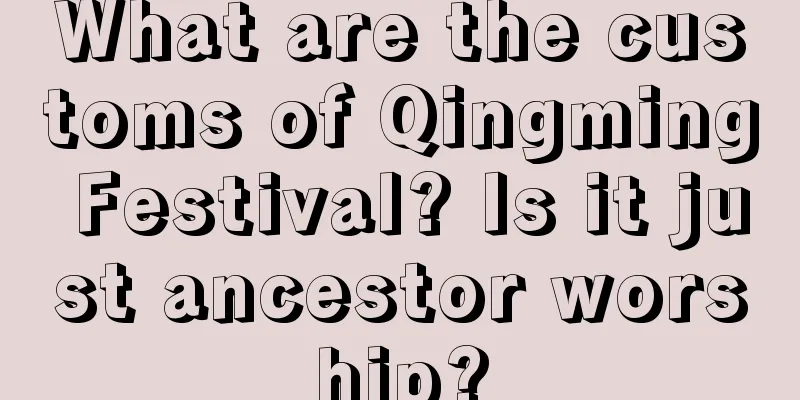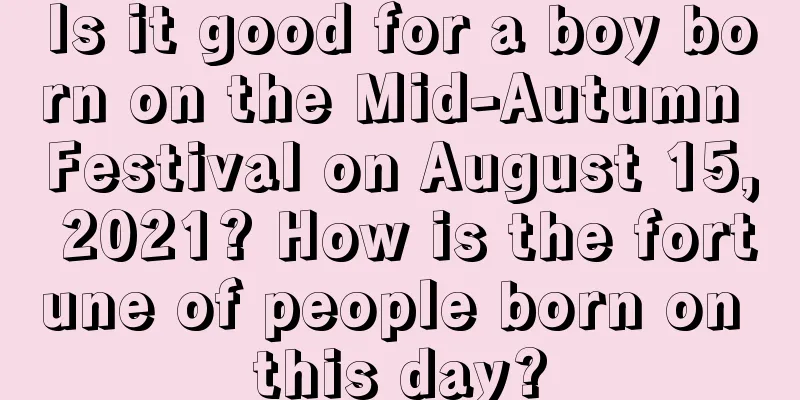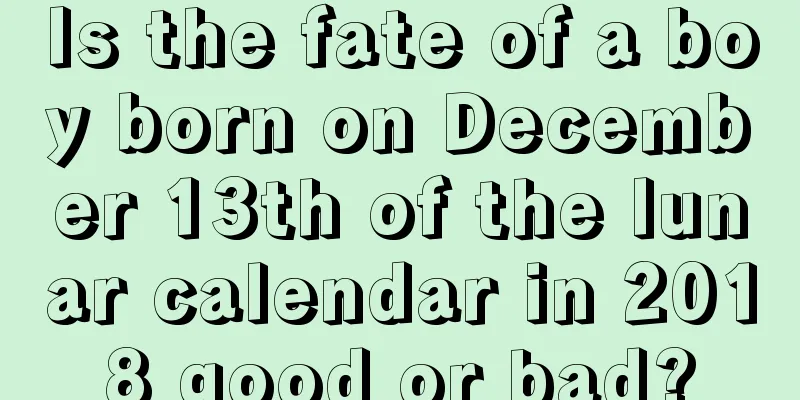What are the customs of Qingming Festival? Is it just ancestor worship?

The Qingming Festival began in the Zhou Dynasty and has a history of 2,500 years. Originally, the emperor and his family would worship their ancestors on this day, and later the people followed suit, and finally it evolved into a festival. Winter has gone and spring has come. February in the lunar calendar has already entered spring. The Fortune Teller website provides you with more detailed information about February in the lunar calendar of 2018!Planting willowsQingming Festival is the time when willows sprout and turn green. People have the custom of picking, wearing and planting willows. When people go for an outing, they can pick a few willow branches and play with them in their hands, weave them into hats and wear them on their heads, or take them home and stick them on the door lintels or eaves. There are proverbs such as "If you don't wear willows on Qingming Festival, your beauty will turn into white hair" and "If you don't wear willows on Qingming Festival, you will turn into a yellow dog after death", which shows that picking willows on Qingming Festival was a very common custom in the old days. It is said that willow branches have the function of warding off evil spirits, so planting willow branches and wearing willow branches is not only a fashionable decoration, but also has the effect of praying for blessings and warding off evil spirits. Planting willow branches on Qingming Festival may also be related to the custom of begging for new fire with willow branches during the Cold Food Festival in the past. Today, it seems that randomly breaking off willow branches is harmful to trees and should not be encouraged.Tomb sweeping and ancestor worshipIn Chinese history, it has long been a custom to ban fire during the Cold Food Festival and to pay tribute to ancestors. After the Tang Dynasty, the Cold Food Festival gradually declined, so tomb sweeping and ancestor worship on Qingming Festival became a continuous festival tradition. The great Tang Dynasty poet Bai Juyi once described in his poem "Cold Food Wild View": "Crows cry, magpies chatter in the dark trees, who is crying on Cold Food Day? Wind blows paper money flying in the wilderness, ancient tombs are covered with green spring grass. Pear blossoms reflect on poplar trees, all of which are places of life and death separation. The cries of the deep graves cannot be heard, only the evening rain returns." The Song Dynasty poet Gao Juqing also described in his poem "Cold Food": "There are many tombs on the mountaintops in the north and south, and people sweep the tombs on Qingming Festival. Paper ashes fly like white butterflies, tears and blood turn red cuckoos. Foxes sleep on tombs at sunset, and children come home at night and laugh in front of the lights. When one has wine in life, one must get drunk, for not a drop of it has ever reached the underworld." Even in today's society, people still have the custom of visiting tombs to sweep tombs and worship their ancestors around Qingming Festival: weeding, placing offerings, burning incense and praying in front of the tombs, burning paper money and gold ingots, or simply offering a bouquet of flowers to express their remembrance of their ancestors.CujuJu is a leather ball made of leather and stuffed with hair inside. Cuju is kicking the ball with the feet. This was a favorite game during the Qingming Festival in ancient times. According to legend, it was invented by Huangdi and its original purpose was to train warriors.Shooting the WillowShooting willow is a game for practicing archery skills. According to records from the Ming Dynasty, they would put a pigeon in a gourd, then hang the gourd high up on a willow tree, shoot the gourd with a bow, and the pigeon would fly out, and the winner would be determined by how high the pigeon flew.Flying a kiteIt is also a favorite activity among people during the Qingming Festival. During the Qingming Festival, people set off fireworks not only during the day but also at night. At night, strings of colorful lanterns are hung under the kite or on the wind-stable pull line. They look like twinkling stars and are called "magic lanterns." In the past, some people would cut the strings after releasing the kites into the blue sky and let the breeze carry them to the ends of the earth. It was said that this would ward off disease and disaster and bring good luck.cockfightingIn ancient times, cockfighting was popular during the Qingming Festival. It started from the Qingming Festival and lasted until the summer solstice. The earliest record of cockfighting in my country can be found in Zuo Zhuan. In the Tang Dynasty, cockfighting became popular. Not only ordinary people fought cockfights, but even the emperor participated in cockfighting. For example, Emperor Xuanzong of Tang loved cockfighting the most.OutingAlso called spring outing. In ancient times, it was called Tanchun, Xunchun, etc. During the Qingming Festival in March, spring returns to the earth and nature is full of vitality. It is a great time for an outing. The Chinese people have long maintained the custom of outing during the Qingming Festival.Silkworm Flower FestivalThe Silkworm Flower Festival is a unique folk culture in the silkworm hometown. In the past, during the Qingming Festival, this folk activity was held in Wutong, Wuzhen, Chongfu, Zhouquan and other places. Among them, the silkworm flower fairs at Ma Ming Temple in Zhouquan and Shuang Miao Zhu in Qingshi are particularly splendid and grand. Ma Ming Temple is located in the west of Zhouquan Town and is known as the "King of Temples" locally. Every year, the Silkworm Festival is crowded with people and there are frequent activities, including welcoming the Silkworm God, rowing speedboats, making noise on the stage, worshiping on incense stools, boxing, dragon lanterns, high poles, singing operas and more than ten other activities. Some of these activities are carried out on shore, but most of them are carried out on boats, which is very characteristic of the water town. In recent years, the Silkworm Flower Festival in Wuzhen's incense market activities only has a few events such as welcoming the Silkworm God, stepping on the white boat, and lifting the high pole, which has great potential to be tapped. What festivals are there in April?SwingThis is the custom of Qingming Festival in ancient my country. Swing means moving by holding a leather rope. It has a very ancient history. It was originally called Qianqiu, but later it was changed to swing to avoid taboos. In ancient times, swings were mostly made of tree branches as frames, tied with colorful ribbons. Later it gradually developed into a swing with two ropes and pedals. Swinging can not only improve health, but also cultivate courage. It is still loved by people, especially children.Planting treesAround the Qingming Festival, the spring sun shines and the spring rain falls, so the survival rate of planted seedlings is high and they grow fast. Therefore, my country has had the custom of planting trees during Qingming Festival since ancient times. Some people also call Qingming Festival "Arbor Day". The custom of planting trees has been passed down to this day. In 1979, the Standing Committee of the National People's Congress designated March 12 of each year as my country's Arbor Day. This is of great significance in mobilizing people of all ethnic groups across the country to actively carry out activities to green the motherland.Hook"Qiangou" is an ancient name, which is actually the modern tug-of-war sport. It is said that during the Spring and Autumn Period, the State of Chu used the sport of hook pulling to strengthen the people's physique in order to attack the State of Wu. It is mainly made of a hemp rope with many small ropes at both ends. During the competition, a large flag is used as the boundary. At a command, both sides pull the rope hard, drums and music sound, and both sides cheer and shout, making it very lively. |
<<: What is the fate and personality of people born in the Year of Horse during Qingming Festival?
>>: When is Qingming Festival in 2018? What are the taboos during Qingming Festival?
Recommend
What is the zodiac sign of people born on Cold Clothes Festival in 2019?
What is the zodiac sign of people born on Cold Clo...
Is May 18, 2020 a suitable day for funerals? Check the auspiciousness and inauspiciousness of July 8!
Introduction: Funeral is one of the important matt...
Is it suitable to move and set up the bed in the Minor Cold of 2021? Auspicious time to set up the bed in the Minor Cold of 2020 (Lunar Calendar)
Introduction: It is generally necessary to choose ...
What are the suitable days for seeking offspring in December 2019?
What are the suitable days for seeking offspring i...
What is the most thoughtful gift for a boyfriend to give to his girlfriend on Valentine's Day in 2017?
Introduction: According to folklore, the Chinese V...
What is the zodiac sign of a baby born on October 18, 2020, and what are their personality traits?
Introduction: Another new day has arrived, and it ...
A collection of must-read WeChat greetings for Mother’s Day 2017!
Introduction: Mother's Day is coming soon. For...
Can I get married on the fourth day of the eleventh lunar month in 2018? Is it okay to get engaged and hold a wedding?
Shui Mo Xiansheng website has carefully compiled ...
Interpretation of the five elements and destiny of girls born on April 23rd of the lunar calendar in 2020!
Every girl deserves the luck and love in the world...
What are the do’s and don’ts for the 11th day of the first lunar month in 2022? Is it appropriate to go back to my parents’ home on the eleventh day of the first lunar month?
The first month of the lunar calendar is the month...
When did China's Children's Day begin? Is it okay to hold a banquet on June 1, 2020?
Introduction: China's Children's Day has e...
Is the ninth day of the eleventh lunar month in 2020 a good day? What date is it?
Is the ninth day of the eleventh lunar month in 2...
Will express delivery be closed on Labor Day 2021? Introduction to the May Day holiday arrangements in 2021
With the development of the times, online shopping...
Is it appropriate to hold a funeral on Laba Festival in 2021? What is the meaning of Laba Festival?
Introduction: It is generally necessary to choose ...
Is it okay to get the marriage certificate on March 13th of the lunar calendar in 2020? Can I get engaged and married?
Engagement is a confirmation ceremony before marr...









